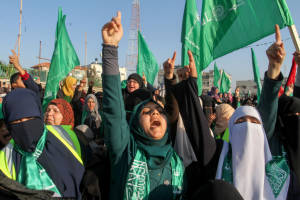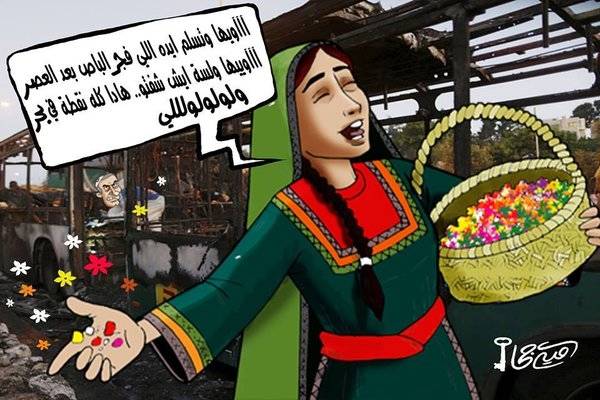The Palestinian jubilation over the recent terror attack is yet another reminder of the growing radicalization among Palestinians. For now, all indications are that the Palestinians are headed towards upgrading the “Knife Intifada” to a wave of bombings against civilian targets inside Israel.
By: Khaled Abu Toameh, Gatestone Institute
- The Palestinian jubilation over Monday’s terror bombing in Jerusalem, the first of its kind since the suicide bombings during the Second Intifada more than a decade ago, is yet another reminder of the growing radicalization among Palestinians.
- The major obstacle to peace with Israel remains the absence of education for peace with Israel. In fact, it is safe to say that there never was a real attempt on the part of Palestinian leaders and factions to prepare their people for peace with Israel. On the contrary, the message they send to their people remains extremely anti-Israel.
- This casts doubt on the Palestinian leadership’s and people’s willingness to move toward peace and coexistence with Israel.
Shortly after the Jerusalem bus terror explosion attack on April 18, a number of Palestinian factions rushed to issue statements applauding the “heroic operation” and urging Palestinians to pursue the path of armed struggle against Israel.
The Palestinian jubilation over the terror attack, the first of its kind since the suicide bombings during the Second Intifada more than a decade ago, is yet another reminder of the growing radicalization among Palestinians. This radicalization is mostly attributed to the ongoing anti-Israel incitement and indoctrination by various Palestinian factions and leaders.
Not surprisingly, the first Palestinian group to applaud the Jerusalem bus attack was Hamas.
Hamas spokesman Sami Abu Zuhri said that his movement “welcomes the Jerusalem operation and considers it a natural response to Israeli crimes, especially extra-judicial executions and the desecration of the Al-Aqsa Mosque.”
The Hamas spokesman was in fact echoing similar charges made by Palestinian Authority President Mahmoud Abbas, who declared that Palestinians will not allow Jews to be “defiling the Aqsa Mosque with their filthy feet.”
How can anyone blame Hamas for making such accusations against Jews when Abbas, Israel’s peace partner, was the first to come out against tours by Jews to the Temple Mount? It is worth mentioning that Abbas’s allegations came only a few weeks before the eruption of the “Knife Intifada” in early October.
Another Hamas leader, Hussar Badran, also praised the terror attack. He said his movement was determined to pursue the resistance to “expel the occupation from our Palestinian lands.”
When Hamas leaders talk about “expelling the occupation from the Palestinian lands,” they mean that Israel should be eliminated and replaced with an Islamist empire.
On Hamas’s Al-Aqsa TV, broadcaster Mohamed Hamed was so happy and excited to hear about the Jerusalem terror attack that he decided to salute the perpetrators.
Other Palestinians who are not necessarily Hamas supporters took to social media to praise the terror attack and call for more. On Twitter, many Palestinian activists created hashtags called #Bus12 and #TheRoofoftheBusGoesFlying to celebrate the terror attack.
Reflecting the state of jubilation over the Jerusalem terror attack, Palestinian cartoonists quickly joined the chorus of those celebrating the “heroic operation” against Israeli civilians. One of them, Omayya Juha, responded quickly by drawing a cartoon featuring a Palestinian woman celebrating the terror attack by ululating and handing out candies.
Within hours of the attack, Palestinian factions seemed to be competing with each other over who would issue the most supportive statement of the terror explosion. Palestinian Islamic Jihad and the Popular Front for the Liberation of Palestine (PFLP) reacted by issuing separate statements applauding the Jerusalem bus blast. They said it marked a “qualitative development” in the intifada. The two groups vowed to continue killing Israelis as part of an effort to “escalate” the intifada. Later, another group called the Popular Resistance Committees issued its own statement in which it threatened “more painful strikes against the Zionist enemy.”

Palestinians at an anti-Israel rally organised by Hamas. (Abed Rahim Khatib/Flash90)
Even Abbas’s Fatah faction went to great pains to justify the terror attack. In an initial response to the attack, Fatah spokesman Ra’fat Elayan used Hamas’s words to comment on the bus blast: “This is a natural response to Israeli practices against our people, including arrests, killings and recurring incursions into the Al-Aqsa Mosque.”
Later in the evening, there were reports that some Palestinians, particularly in the Gaza Strip, took to the streets to express their joy over the terror attack.
The public statements of the Palestinian leaders and groups after the Jerusalem terror attack are yet another sign of how they continue to incite their people against Israel. These are the type of statements that prompt Palestinian men and women to grab a knife (or in this case an explosive device) and set out to kill the first Jew they run into.
The major obstacle to peace with Israel remains the absence of education for peace with Israel. In fact, it is safe to say that there never was a real attempt on the part of Palestinian leaders and factions to prepare their people for peace with Israel. On the contrary, the message they send to their people remains extremely anti-Israel.
The incitement, threats and fiery rhetoric will only lead to more violence. For now, all indications are that the Palestinians are headed towards upgrading the “Knife Intifada” to a wave of bombings against civilian targets inside Israel. Judging from the reactions of the various Palestinian factions and activists, support for terror attacks against Israel is so widespread among Palestinians that they are prepared to celebrate the bombing of a bus carrying civilians. This casts doubt on the Palestinian leadership’s and people’s willingness to move toward peace and coexistence with Israel.
Khaled Abu Toameh, an award-winning journalist, is based in Jerusalem.
